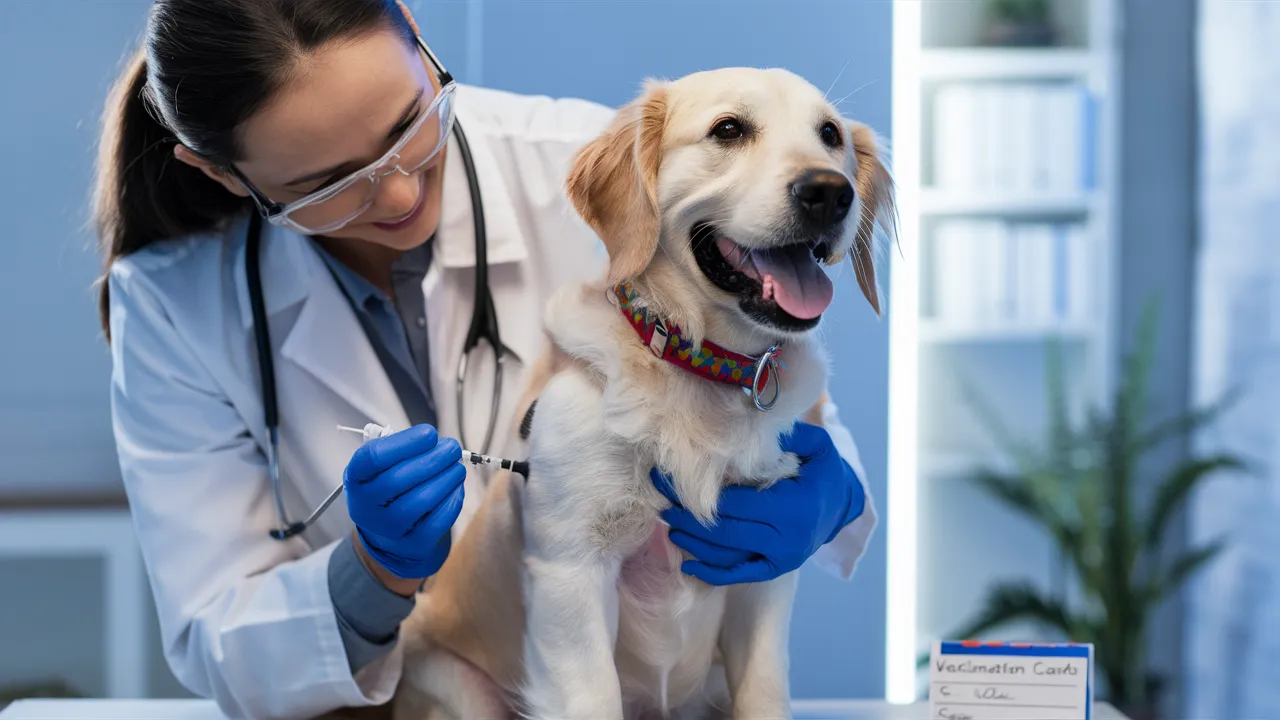Vaccinations are a crucial part of keeping your dog healthy and protected from serious diseases. Just like humans, dogs can be susceptible to various illnesses that can cause discomfort, complications, and even death. Vaccines work by introducing a weakened or inactive form of a virus or bacteria, allowing your dog’s immune system to develop antibodies and fight off future infections. While every dog’s needs are unique, consulting your veterinarian is essential for creating a personalized vaccination plan tailored to your furry friend’s lifestyle and risk factors.
Essential Dog Vaccines
Core Vaccines
The core vaccines are recommended for all dogs, regardless of their lifestyle or location. These vaccines protect against some of the most common and potentially deadly diseases:
- Distemper: A highly contagious viral disease that can cause respiratory, gastrointestinal, and neurological problems.
- Adenovirus: A viral infection that can cause respiratory illness, liver problems, and even death.
- Parvovirus: A highly contagious viral disease that can cause severe gastrointestinal issues, dehydration, and death, especially in puppies.
- Rabies: A fatal viral disease that affects the nervous system and is transmitted through the saliva of infected animals.
Non-Core Vaccines
Non-core vaccines are recommended based on your dog’s individual risk factors, including their lifestyle, location, and exposure to certain diseases. These vaccines may include:
- Bordetella (kennel cough): A highly contagious bacterial infection that causes respiratory symptoms, particularly in dogs that are housed in kennels or other group settings.
- Leptospirosis: A bacterial disease spread through contaminated urine that can cause kidney failure and liver damage.
- Lyme disease: A bacterial disease spread through the bite of infected ticks that can cause joint pain, lameness, and kidney problems.
- Canine influenza: A highly contagious viral infection that causes respiratory symptoms, similar to the flu in humans.
Why is a Vaccination Schedule Important?
A vaccination schedule is vital for dogs for several reasons:
- Gradual Immunity: It allows puppies to build immunity gradually, preventing overwhelming their developing immune systems.
- Disease Protection: Vaccines introduce weakened or inactive pathogens, triggering antibody production and protection against actual diseases.
- Herd Immunity: A high vaccination rate creates herd immunity, making it harder for diseases to spread, even among unvaccinated dogs.
- Puppy Safety: Puppies are highly vulnerable, and a vaccination schedule provides crucial protection during their critical development period.
- Public Health: Vaccines prevent the spread of diseases like rabies, protecting both dogs and humans.
- Peace of Mind: Knowing your dog is vaccinated allows you to enjoy their company without worrying about preventable diseases.

The Dog Injection Schedule
Puppy Dog Injection Schedule
Puppies are particularly vulnerable to diseases, so it’s crucial to start their vaccination series early. The recommended schedule typically includes:
- 6-8 weeks: First round of core vaccines (Distemper, Adenovirus, Parvovirus)
- 10-12 weeks: Second round of core vaccines
- 14-16 weeks: Third round of core vaccines and rabies vaccine
- 16-20 weeks: Booster for core vaccines and rabies
Adult Dog Vaccination Schedule
Adult dogs need booster shots to maintain their immunity against diseases. The recommended booster schedule for adult dogs typically involves:
- Annual boosters: For core vaccines and rabies
- Every 3-5 years: For non-core vaccines, depending on the specific vaccine and your dog’s individual needs.
Regular checkups with your veterinarian are essential for monitoring your dog’s health and ensuring they are up-to-date on their vaccinations.
Understanding Vaccine Side Effects
Common Side Effects
Most vaccines are safe and well-tolerated by dogs. However, some mild side effects are possible, including:
- Lethargy: Your dog may be a little sleepy or less active for a day or two after vaccination.
- Soreness at the injection site: The area where the vaccine was administered may be slightly tender or swollen.
- Mild fever: A slight increase in body temperature is also possible.
These side effects are usually temporary and manageable with rest and supportive care.
Serious Side Effects
While serious side effects are rare, it’s important to be aware of the possibility. These may include allergic reactions, seizures, or other severe complications. If you notice any concerning reactions after your dog’s vaccination, contact your veterinarian immediately.
The Role of Your Veterinarian
Creating a Personalized Vaccination Plan
Your veterinarian plays a crucial role in creating a personalized vaccination plan for your dog. They will consider your dog’s age, breed, lifestyle, location, and any pre-existing health conditions to determine the most appropriate vaccines and schedule.
Monitoring Your Dog’s Health
Regular checkups with your veterinarian are essential for monitoring your dog’s health and ensuring they are responding well to vaccinations. Your veterinarian will also be able to address any concerns you may have about your dog’s health after vaccination.
Conclusion
Vaccinations are a vital part of keeping your dog healthy and protected from serious diseases. By working with your veterinarian to create a personalized vaccination plan and ensuring your dog receives regular booster shots, you can provide them with the best possible protection against illness. Remember, the best way to ensure your dog’s health and well-being is to consult with your veterinarian for personalized advice and guidance.

Related Post
What Human Food Can Dogs Eat?
What Are Dog Bones Made Of?
What Are The First Signs Of Hip Dysplasia In Dogs?